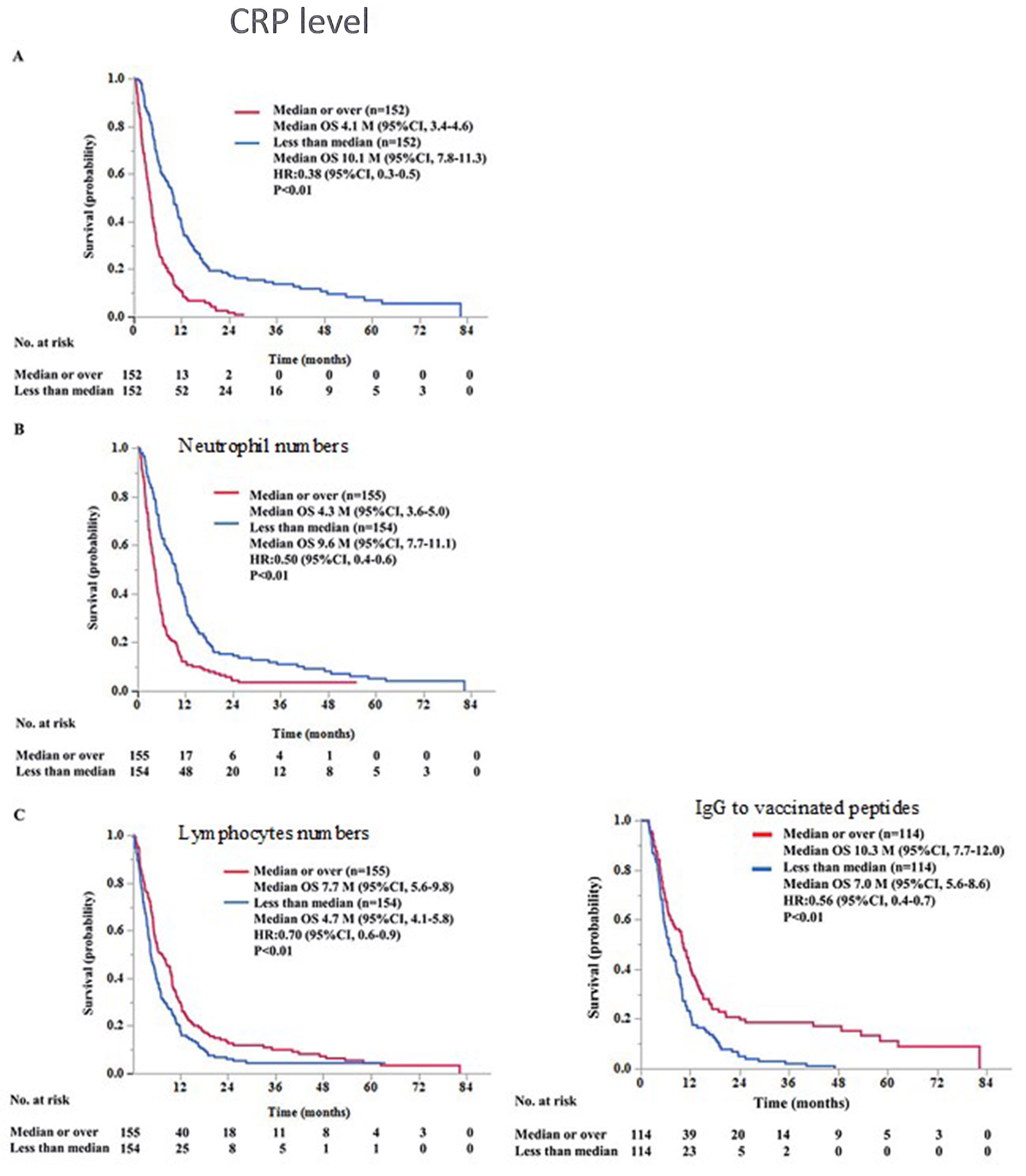In recent years, it has been revealed that the cancer microenvironment composed of various types of cells existing in cancer cells and surrounding stromal cells is one of the causes of cancer metastasis, malignant transformation, and drug resistance. Abnormal activation of MAPK and Wnt/beta-catenin signaling cascades is seen in the process of epithelial dysplasia and carcinogenic process from chronic inflammatory conditions such as IBD (inflammatory bowel disease) and COPD (chronic obstructive pulmonary disease).
Furthermore, the recent development of immunotherapy including immune checkpoint blockade therapy is remarkable, and it can be said that our cancer vaccine studies have played a part in helping advance the field of cancer immunotherapy. Clinical development of personalized peptide vaccines, which was originally conducted in the Cancer Vaccine Center at Kurume University, has now reached the point where it has shifted from academic-based research to private sector development, and therefore we have decided to change the name of the division from “Cancer Vaccine Development” to “Tumor Immunology”, including the meaning of covering the base of cancer research more broadly.
Keeping in mind the phrase “Patients will answer you”, we will continue to develop basic research by modulating tumor immunoreactions aimed at clinical application including prevention, diagnosis, and treatment.
Emiko Mizoguchi, M.D., Ph.D. Division Chief
- Identification of dominant T-cell epitopes in the major Japanese cypress pollen allergen Cha o 3
-
Many kinds of pollen from Cupressaceae/Taxodiaceae-family trees cause pollinosis worldwide. In Japan, pollens of Cryptomeria japonica (Japanese cedar) and Chamaecyparis obtusa (Japanese cypress) are the most common causes of seasonal allergic diseases. Recently, we identified and reported the novel major Japanese cypress pollen allergen Cha o 3 and the homologous Japanese cedar pollen allergen Cry j 4, both of which belong to the cellulase family. High homology (84% amino acid sequence identity) and cross–reactivity at the T-cell level were observed between Cha o 3 and Cry j 4. However, simultaneously, Cha o 3-specific T-cell clones that did not respond to Cry j 4 stimulation were also established, suggesting the existence of epitopes that are unique to Cha o 3. In the present study, we established Cha o 3–specific T-cell lines from a total of 20 Japanese cedar/cypress pollinosis patients, and identified five dominant T-cell epitopes of Cha o 3. Our findings are expected to facilitate the development of a novel T-cell epitope peptide-based allergen immunotherapy for Japanese cypress pollinosis. In addition, our preliminary data suggested the possible existence of dominant Cha o 3 T-cell epitopes that are both shared and distinct from those of Cry j 4.
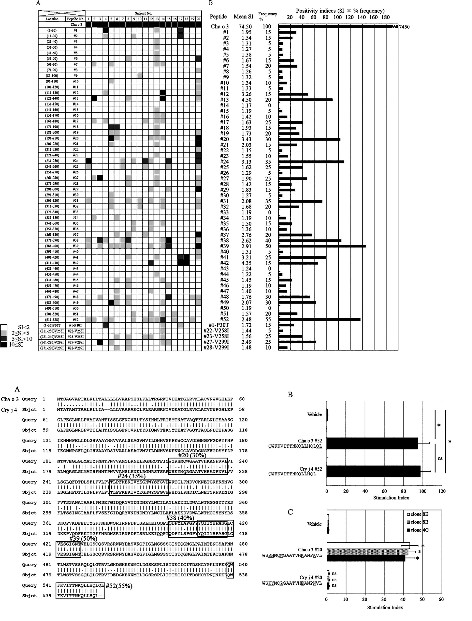
- Mixed 20-peptide cancer vaccine in combination with docetaxel and dexamethasone for castration-resistant prostate cancer: a randomized phase II trial
-
A novel cancer vaccine consisting of 20 mixed peptides (KRM-20) was designed to induce cytotoxic T lymphocytes (CTL) against twelve different tumor-associated antigens. The aim of this phase II trial was to examine whether KRM-20 in combination with docetaxel and dexamethasone enhances the antitumor effects in patients with castration-resistant prostate cancer (CRPC). In this double-blind, placebo-controlled, randomized phase II study, we enrolled chemotherapy-naïve patients with CRPC from ten medical centers in Japan. Eligible patients were randomly assigned 1:1 centrally to receive either KRM-20 combined with docetaxel and dexamethasone (n = 25) or placebo with docetaxel and dexamethasone (n = 26). The primary endpoint was the difference in prostate-specific antigen (PSA) decline between each treatment. The rates of > 50% PSA decline in the two arms were similar (56.5% versus 53.8%; P = 0.851). Human leukocyte antigen (HLA)-matched peptide-specific immunoglobulin G (P = 0.018) and CTL (P = 0.007) responses in the KRM-20 arm significantly increased after treatment. The addition of KRM-20 did not increase toxicity. There were no between-group differences in progression-free or overall survival (OS). The addition of KRM-20 was safe, and similar PSA decline and HLA-matched peptide-specific CTL and IgG responses increased in combination with docetaxel and dexamethasone in CRPC patients. Subgroup analysis suggested that this treatment is favorable for CRPC patients with ≥ 26% lymphocytes or PSA levels of < 11.2 ng/ml, but further clinical trials comparing OS are required.
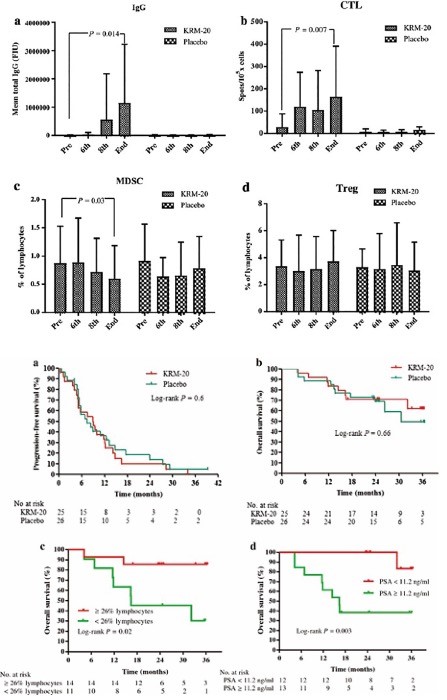
- CD4/CD8 ratio is a prognostic factor in IgG nonresponders among peptide vaccine-treated ovarian cancer patients
-
The identification of useful biomarkers is an urgent issue in cancer treatment — particularly for immunotherapy, since only some patients experience benefits of immunotherapy. The early induction of the IgG response has been reported as a useful biomarker of favorable prognosis for cancer patients treated with a personalized peptide vaccination, but a portion of these patients (IgG non-responders) fail to achieve an early induction of IgG response yet includes long-term survivors. It is thus necessary to identify other biomarkers of favorable prognosis among these patients. Here we report the usefulness of classical T-cell markers (i.e., the CD8 content and the CD4/CD8 ratio in peripheral blood) in IgG non-responders among advanced or recurrent ovarian cancer patients treated with a personalized peptide vaccination. Among IgG non-responders (n=25), the overall survival (OS) of the increased-CD8 group (n=7) was significantly longer than that of the decreased-CD8 group (n=18) (p=0.018), and the OS of the patients with a decreased CD4/CD8 ratio (n=10) was significantly longer than that of the patients with an increased ratio(n=15) (p=0.0055). Thus, an increased content of CD8 and a decreased CD4/CD8 ratio are each favorable prognosis markers in IgG non-responders treated with a personalized peptide vaccination.
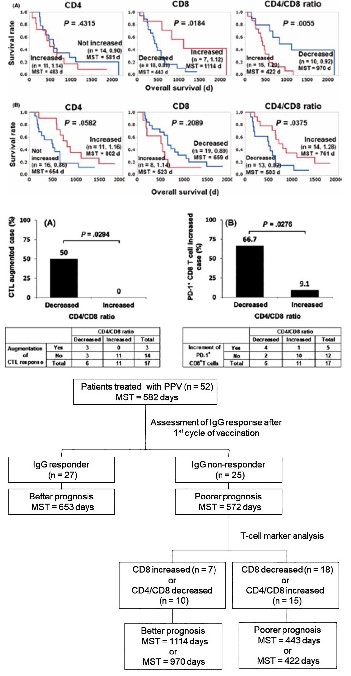
- Identification of biomarkers for personalized peptide vaccination in 2,588 cancer patients
-
Peptide‑based cancer vaccines have failed to provide sufficient clinical benefits in order to be approved in clinical trials since the 1990s. To understand the mechanisms underlying this failure, the present study investigated biomarkers associated with the lower overall survival (OS) among 2,588 patients receiving personalized peptide vaccination (PPV). Survival data were obtained from a database of 2,588 cancer patients including 399 patients with lung, 354 with prostate and 344 with colon cancer. They entered into phase II clinical trials of PPV in which 2 to 4 of 31 warehouse peptides were selected for vaccination on an individual patient basis based on human leukocyte antigen (HLA) class IA‑types and pre‑existing peptide‑specific IgG levels. Higher pre‑vaccination neutrophil, monocyte and platelet counts, and lower pre‑vaccination lymphocyte and red blood cell counts were inversely associated with OS, with higher sensitivities in the proportions of neutrophils and lymphocytes, respectively. The most potent unfavorable and favorable factors for OS were the median percentage of neutrophils (≥64.8%) or percentage of lymphocytes (≥25.1%) with correlation coefficients (R2) of 0.98 and 0.92, respectively. Higher pre‑vaccination levels of c‑reactive protein and other inflammatory soluble factors were inversely associated with OS. Pre‑vaccination peptide‑specific immunity levels had no effect on OS, although lower immune boosting levels were inversely associated with OS. None of the 31 peptides was inversely associated with OS, although a few peptides were positively associated with it. On the whole, the findings of the present study suggested that pre‑vaccination inflammatory signatures, but not those of post‑vaccination immune induction, were associated with lower clinical benefits of PPV.
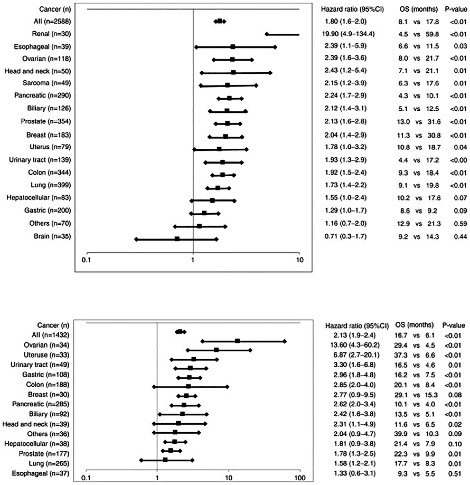
- Integrity of plasma DNA is inversely correlated with vaccine-induced antitumor immunity in ovarian patirents
-
Cancer immunotherapy including vaccine therapy is a promising modality for cancer treatment, but few patients show its clinical benefits currently. The identification of biomarkers that can identify patients who will benefit from cancer immunotherapy is thus important. Here, we investigated the potential utility of the circulating cell-free DNA (cfDNA) integrity — a ratio of necrotic cell-derived, longer DNA fragments versus apoptotic cell-derived shorter fragments of Alu gene — as a biomarker of vaccine therapy for patients with ovarian cancer. We analyzed plasma samples from 39 patients with advanced or recurrent ovarian cancer enrolled in clinical trials for personalized peptide vaccinations. We observed that (1) the cfDNA integrity was decreased after the 1st cycle of vaccination, and (2) the decreased levels of cfDNA integrity were correlated with vaccine-induced immune responses; i.e., decreased cfDNA integrity was observed in 91.7% and 59.3% of the IgG-positive and -negative patients, respectively (p=0.0445). Similarly, decreased cfDNA integrity was observed in 92.9% and 56.0% of CTL response-positive and -negative patients, respectively (p=0.0283). These results suggest that the circulating cfDNA integrity is a possible biomarker for cancer vaccine therapy.
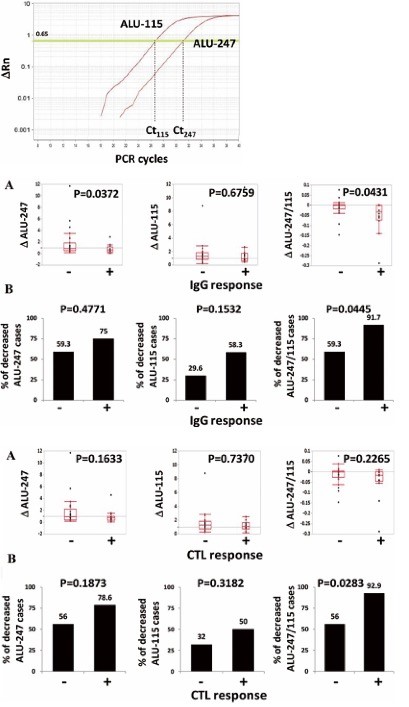
- Early phase II study of mixed 19-peptide vaccine monotherapy for refractory triple-negative breast cancer.
-
We undertook an early phase II study of mixed 19-peptide cancer vaccine monotherapy for 14 advanced metastatic triple-negative breast cancer (mTNBC) patients refractory to systemic chemotherapy to develop a new type of cancer vaccine. The treatment protocol consisted of a weekly vaccination for 6 weeks, and there were no severe adverse events related to the vaccination throughout the trial. Increase of peptide-specific IgG against the vaccinated human leukocyte antigen-matched peptides, but not against the nonmatched peptides, was positively correlated with overall survival (OS) (P < .01). The median OS was 11.5 or 24.4 months in all 14 patients or the 10 patients who completed the vaccination. The patients with lower C-reactive protein levels or 3 or fewer systemic chemotherapies were favorable candidates for this treatment. Advancement of this therapy to the next stage of study could be warranted based on the safety and immune boosting determined herein (clinical trial registration number: UMIN000014616).
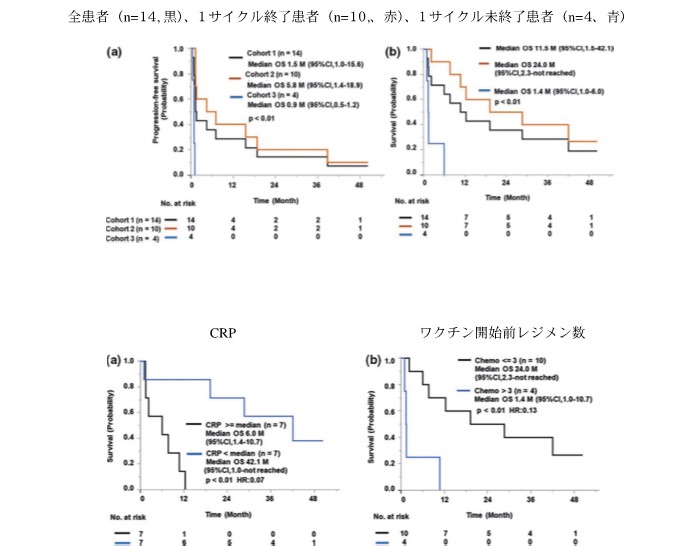
- Integrity of plasma cell-free DNA as a prognostic factor for vaccine therapy in patients with endometrial cancer
-
Endometrial cancer is the most prevalent gynecological cancer in developed countries. Although the prognosis of endometrial cancer is better than that of other gynecological cancers, the prognosis of advanced endometrial cancer is still poor and thus new therapeutic modalities, such as immune therapies, are urgently required. For the further development of new modalities, exploration of new biomarkers is important. The present study investigated the circulating cell-free DNA (cfDNA) integrity as a ratio of the necrotic tumor cell-derived long cfDNA fragments to the total dead cell-derived short cfDNA fragments from genomic Alu elements in patients with advanced endometrial cancer during peptide vaccination treatment. The results demonstrated that: i) The plasma cfDNA integrity was decreased during the first cycle of vaccination in patients with endometrial cancer treated with the personalized peptide vaccination, and ii) the post-vaccination cfDNA integrity levels were correlated with good prognosis. Some of these findings have been confirmed in other cancers, and thus cfDNA integrity might be an important marker for future cancer vaccine therapies in general, and might also be applicable for other immune therapies.
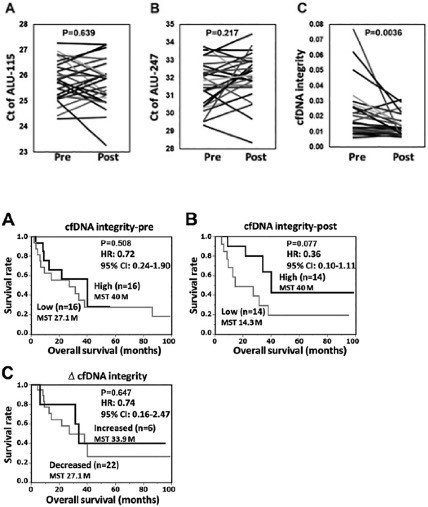
- Integrity of circulating cell-free DNA as a prognostic biomarker for vaccine therapy in patients with nonsmall cell lung cancer
-
Background: Many clinical trials of immune checkpoint blockade-based combination therapies are under way. Vaccine therapy is a promising partner of combination therapies. We have developed a personalized peptide vaccination and conducted clinical trials of it in patients with various cancers. At the present time, we have only a limited number of biomarkers related to the prognosis of vaccine-treated patients. Thus, new biomarkers are urgently needed.
Methods: In this study, we investigated the plasma cell-free DNA (cfDNA) integrity-a ratio of the necrotic tumor cell-derived long cfDNA fragments to the total dead cell-derived short cfDNA fragments from genomic Alu elements-in patients with advanced nonsmall cell lung cancer during treatment with the personalized peptide vaccination.
Results: We found that (1) the cfDNA integrity was decreased after the first cycle of vaccination, and (2) the patients with high prevaccination cfDNA integrity survived longer than those with low prevaccination integrity (median survival time (MST): 17.9 versus 9.0 months, respectively; hazard ratio (HR): 0.58, p = .0049). A similar tendency was observed in postvaccination cfDNA integrity (MST: 16.4 vs 9.4 months; HR: 0.65, p = .024).
Conclusions: These results suggest that cfDNA integrity is a possible prognostic biomarker in patients treated with the personalized peptide vaccine.
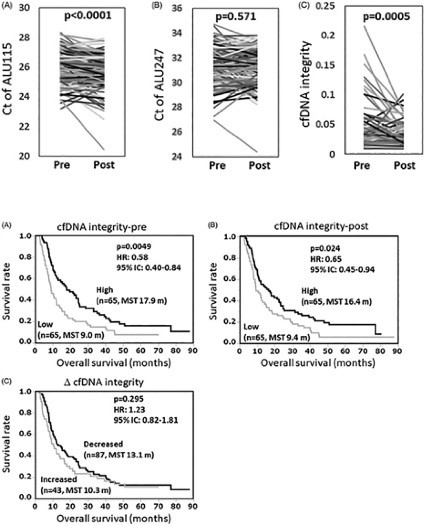
- Investigation of factors associated with reduced clinical benefits of personalized peptide vaccination for pancreatic cancer
-
The aim of the present study was to determine the factors associated with reduced clinical benefits of personalized peptide vaccination (PPV) for pancreatic cancer. Phase II PPV clinical trials comprising 309 (8 non-advanced and 301 advanced-stage) patients with pancreatic cancer were conducted. Two to four peptides were selected among a set of 31 different peptides as vaccine candidates for personalized peptide vaccination based on human leukocyte antigen types and preexisting peptide-specific IgG levels, and subcutaneously injected. The selected peptides were subcutaneously injected. Of the 309 patients, 81 failed to complete the 1st PPV cycle due to rapid disease progression, and their median overall survival [2.1 months; 95% confidence interval (CI), 1.8-2.7] was significantly shorter than that of the remaining 228 patients (8.4 months; 95% CI, 8.4-9.9; P<0.01). ‘Immune boosting’ was defined when IgG levels before vaccination increased more than 2-fold after vaccination. Immune boosting was observed in the majority of patients with PPV irrespective of whether or not they received concomitant chemotherapy. Additionally, patients demonstrating immune boosting exhibited longer survival rates. Although the positive-response rates and peptide-specific IgG levels in pre- and post-vaccination samples differed among the 31 peptides, patients exhibiting immune boosting in response to each of the vaccinated peptides demonstrated longer survival times. Pre-vaccination factors associated with reduced clinical benefits were high c-reactive protein (CRP) levels, high neutrophil counts, lower lymphocyte and red blood cell counts, advanced disease stage and the greater number of chemotherapy courses prior to the PPV treatment. The post-vaccination factors associated with lower clinical benefits were PPV monotherapy and lower levels of immune boosting. In conclusion, pre-vaccination inflammatory signatures, rather than pre- or post-vaccination immunological signatures, were associated with reduced clinical benefits of personalized peptide vaccination (PPV) for pancreatic cancer.
